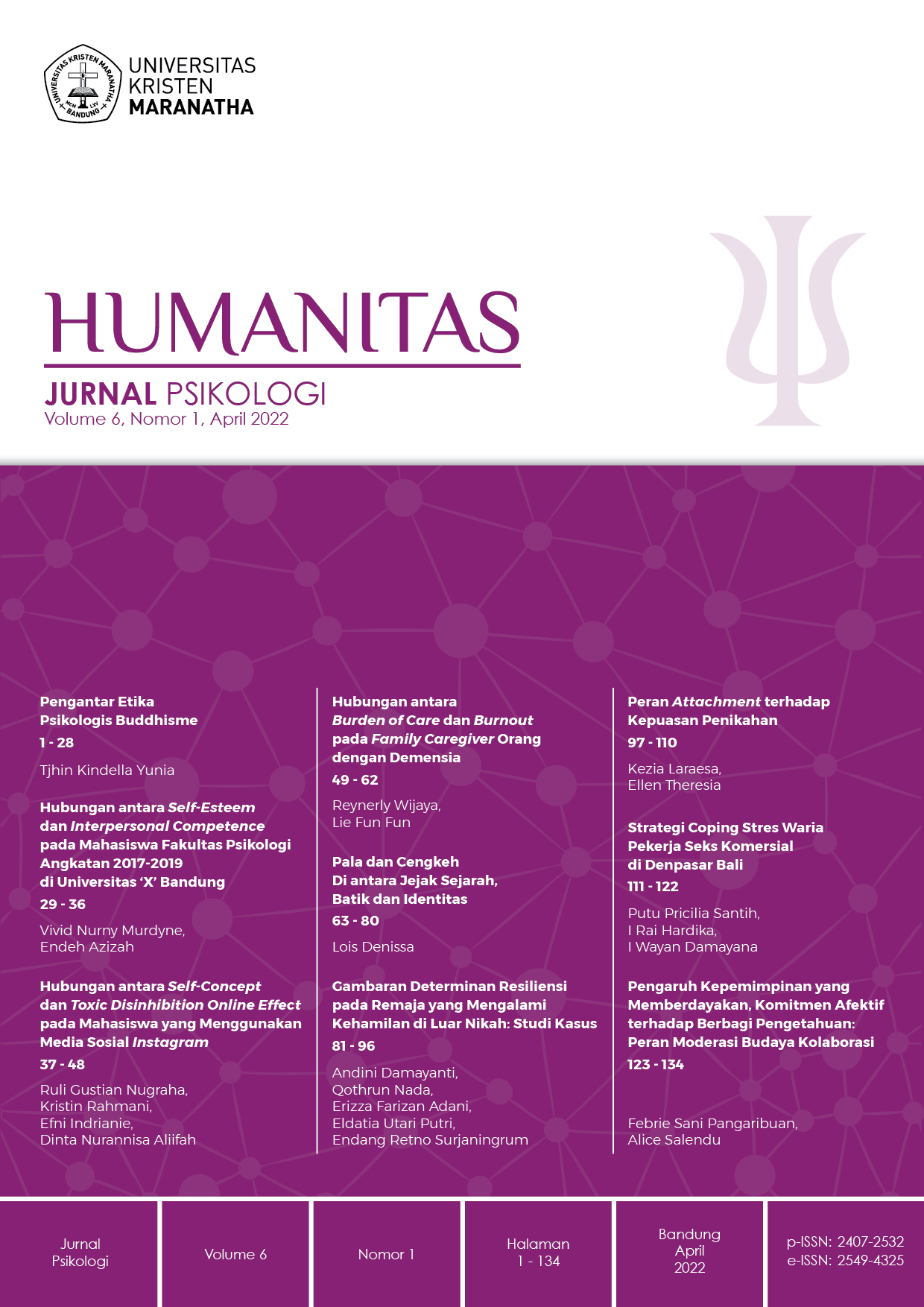Pengaruh Kepemimpinan yang Memberdayakan, Komitmen Afektif terhadap Berbagi Pengetahuan: Peran Moderasi Budaya Kolaborasi
Isi Artikel Utama
Abstrak
Unduhan
Rincian Artikel

Artikel ini berlisensi Creative Commons Attribution-NonCommercial 4.0 International License.
Referensi
Aasland, M. S., Skogstad, A., Notelaers, G., Nielsen, M. B., & Einarsen, S. (2010;2009;). The prevalence of destructive leadership behaviour. British Journal of Management, 21(2), 438 452. https://doi.org/10.1111/j.1467-8551.2009.00672.x
Albrecht, S. L., & Andreetta, M. (2011). The influence of empowering leadership, empowerment and engagement on affective commitment and turnover intentions in community health service workers: Test of a model. Leadership in Health Services, 24(3), 228–237. https://doi.org/10.1108/17511871111151126
Allen, N. J., & Meyer, J. P. (1990). The measurement and antecedents of affective, continuance and normative commitment to the organization. Journal of Occupational Psychology, 63(1), 1–18. https://doi.org/10.1111/j.2044-8325.1990.tb00506.x
Anand, A., Walsh, I., & Moffett, S. (2019). Does humility facilitate knowledge sharing? Investigating the role of humble knowledge inquiry and response. Journal of Knowledge Management, 23(6), 1218–1244. https://doi.org/10.1108/JKM-06-2018-0353
Bavik, Y. L., Tang, P. M., Shao, R., & Lam, L. W. (2018). Ethical leadership and employee knowledge sharing: Exploring dual-mediation paths. Leadership Quarterly, 29(2), 322–332. https://doi.org/10.1016/j.leaqua.2017.05.006
Blau, P. M. (1964). Exchange and power in social life. Exchange and Power in Social Life, 1–352. https://doi.org/10.4324/9780203792643
Cavaliere, V., Lombardi, S., & Giustiniano, L. (2015). Knowledge sharing in knowledge-intensiQve manufacturing firmAQs. An empirical study of its enaZblers. Journal of Knowledge Management, 19(6), 1124–1145. https://doi.org/10.1108/JKM-12-2014-0538
DJKN. 2018. Budayakan Berbagi Pengetahuan. Diakses dari https://www.djkn.kemenkeu.go.id/kanwil-jakarta/baca-berita/15241/Budayakan-Berbagi-Pengetahuan.html pada tanggal 26 Mei 2022
Hooff, V. D. B., & Ridder, J. A. (2004). Knowledge sharing in context: The influence of organizational commitment, communication climate and CMC use on knowledge sharing. Journal of Knowledge Management, 8(6), 117–130. https://doi.org/10.1108/13673270410567675
Jeung, C. W., Yoon, H. J., & Choi, M. (2017). Exploring the affective mechanism linking perceived organizational support and knowledge sharing intention: a moderated mediation model. Journal of Knowledge Management, 21(4), 946–960. https://doi.org/10.1108/JKM-12-2016-0530
Jiang, D., & Chen, Z. (2021). Innovative Enterprises Development and Employees’ Knowledge Sharing Behavior in China: The Role of Leadership Style. Frontiers in Psychology, 12(October), 1–13. https://doi.org/10.3389/fpsyg.2021.747873
Jiang, Y., & Chen, C. C. (2018). Integrating Knowledge Activities for Team Innovation: Effects of Transformational Leadership. Journal of Management, 44(5), 1819–1847. https://doi.org/10.1177/0149206316628641
Kim, M., & Beehr, T. A. (2020). Empowering leadership: leading people to be present through affective organizational commitment?*. International Journal of Human Resource Management, 31(16), 2017–2044. https://doi.org/10.1080/09585192.2018.1424017
Kim, S. L. (2021). Supervisor knowledge sharing and employee knowledge sharing: The moderating roles of learning goal orientation and affective organizational commitment. Sustainability (Switzerland), 13(8). https://doi.org/10.3390/su13084176
Le, P. B., Lei, H., Le, T. T., Gong, J., & Ha, A. T. L. (2020). Developing a collaborative culture for radical and incremental innovation: the mediating roles of tacit and explicit knowledge sharing. Chinese Management Studies, 14(4), 957–975. https://doi.org/10.1108/CMS-04-2019-0151
Li, J., Wu, N., & Xiong, S. (2021). Sustainable innovation in the context of organizational cultural diversity: The role of cultural intelligence and knowledge sharing. PLoS ONE, 16(5 May), 1–23. https://doi.org/10.1371/journal.pone.0250878
Lorinkova, N. M., & Perry, S. J. (2017). When Is Empowerment Effective? The Role of Leader-Leader Exchange in Empowering Leadership, Cynicism, and Time Theft. Journal of Management, 43(5), 1631–1654. https://doi.org/10.1177/0149206314560411
Nerstad, C. G. L., Searle, R., ?erne, M., Dysvik, A., Škerlavaj, M., & Scherer, R. (2018). Perceived mastery climate, felt trust, and knowledge sharing. Journal of Organizational Behavior, 39(4), 429–447. https://doi.org/10.1002/job.2241
Nugroho, M. A. (2018). The effects of collaborative cultures and knowledge sharing on organizational learning. Journal of Organizational Change Management, 31(5), 1138–1152. https://doi.org/10.1108/JOCM-10-2017-0385
Pearce, B. J., & Deutsch, L. (2022). Going beyond the AHA! moment: insight discovery for transdisciplinary research and learning. Humanities and Social Sciences Communications. https://doi.org/10.1057/s41599-022-01129-0
Pearce, C. L., & Sims, H. P. (2002). Vertical versus shared leadership as predictors of the effectiveness of change management teams: An examination of aversive, directive, transactional, transformational, and empowering leader behaviors. Group Dynamics, 6(2), 172–197. https://doi.org/10.1037/1089-2699.6.2.172
Pérez López, S., Manuel Montes Peón, J., & José Vázquez Ordás, C. (2004). Managing knowledge: The link between culture and organizational learning. Journal of Knowledge Management, 8(6), 93–104. https://doi.org/10.1108/13673270410567657
Razmerita, L., Kirchner, K., & Nielsen, P. (2016). What factors influence knowledge sharing in organizations? A social dilemma perspective of social media communication. Journal of Knowledge Management, 20(6), 1225–1246. https://doi.org/10.1108/JKM-03-2016-0112
Rhoades, L., & Eisenberger, R. (2001). Affective commitment to the organization: The contribution of perceived organizational support. Journal of Applied Psychology, 86(5), 826–836.
Turkmendag, Z., & Tuna, M. (2021). Empowering leadership and knowledge management: the mediating role of followers’ technology use. Journal of Organizational Change Management. https://doi.org/10.1108/JOCM-11-2020-0364
Wu, W. L., & Lee, Y. C. (2017). Empowering group leaders encourages knowledge sharing: integrating the social exchange theory and positive organizational behavior perspective. Journal of Knowledge Management, 21(2), 474–491. https://doi.org/10.1108/JKM-08-2016-0318
Yang, Z., Nguyen, V. T., & Le, P. B. (2018). Knowledge sharing serves as a mediator between collaborative culture and innovation capability: an empirical research. Journal of Business and Industrial Marketing, 33(7), 958–969. https://doi.org/10.1108/JBIM-10-2017-0245
Yun, S., Cox, J., & Sims, H. P. (2006). The forgotten follower: A contingency model of leadership and follower self-leadership. Journal of Managerial Psychology, 21(4), 374–388. https://doi.org/10.1108/02683940610663141
Zheng, X., Li, L., Zhang, F., & Zhu, M. (2019). The roles of power distance orientation and perceived insider status in the subordinates’ Moqi with supervisors and sustainable knowledge-sharing. Sustainability (Switzerland), 11(5). https://doi.org/10.3390/su11051421
Zhou, K. Z., & Li, C. B. (2012). How knowledge affects radical innovation: Knowledge base, market knowledge acquisition, and internal knowledge sharing. Strategic Management Journal, 33(9), 1090–1102. https://doi.org/10.1002/smj.1959

